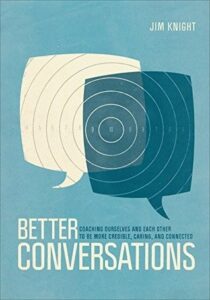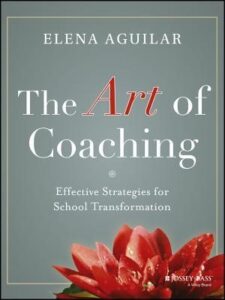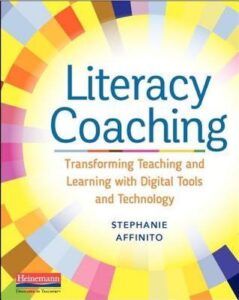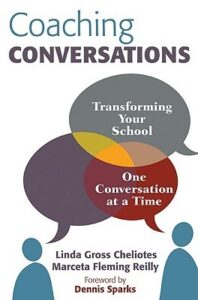If you were unable to attend the instructional development day on January 10, or simply want to re-watch the morning sessions on AI, the recording is available here. The slideshows used in the sessions are available here. Enjoy! — and please let us know if you have any questions or want to further discuss AI assignments and policies.
Author Archives: Sharon Birch
A Note from the TLDS Director
Welcome to a new academic year! Fall on a college campus is like nothing else. There is just an excitement and energy that is not replicated at any other time in the academic year.
The College is fresh off welcoming one of our largest faculty cohorts and one of the largest student classes in recent years, and the Studio is excited to learn and grow with you. We hope that you will take advantage of all that the Studio has to offer.
Because this is the first full academic year in which I will be assuming my new role as the Director of the Teaching & Learning Design Studio, I want to briefly introduce myself and make you aware of some of the ways the Studio can support you.
This is my seventh year at Etown, and I am an associate professor in our education department. I teach literacy courses and have research interests in literacy teacher education; children’s, middle grades, and young adult literature; and technology integration in the literacy classroom. I enjoy bringing students to state-level literacy conferences and have my reading specialist certification and instructional coach endorsement. One of my favorite parts of my work as a literacy teacher educator is facilitating professional development to practicing teachers.
I am excited to translate my work in this space to Etown’s Teaching & Learning Design Studio. The Studio is dedicated to supporting the needs of faculty and other employees across campus. Our team is excited to continue our year-long new faculty orientation program, collaborate with schools to offer catered professional development, provide Canvas support, design optimal online and face-to-face learning experiences for your students, coach individual faculty members in a host of areas, highlight the important work of our Studio fellows, engage in design thinking sessions with your team, observe your teaching practices, and have meaningful conversations around teaching and learning on our campus.
Let me take a few moments to introduce my Studio colleagues, who are also eager to work with you. Sharon Birch is our Assistant Director and Instructional Technologist. She has a wealth of experience in higher education, is currently teaching a First Year Seminar, and can answer your Canvas questions – and many others! Jill Kleis, our Program Coordinator, is available for design thinking sessions in your unit and handles many of the logistics for the Studio. Our Instructional Designer and Online Learning Specialist Crystal Donlan is available for instructional design work and coaching around best practices in higher education learning spaces.
Be sure to frequent our blog frequently for teaching ideas, and make sure to follow us on LinkedIn (Etown Teaching and Learning Design Studio). Please let us know how the Studio can help support your professional development goals. You may email me directly or email studio@etown.edu with questions.
I am excited to learn and grow with you this academic year!
Sincerely,
Katie
Let’s talk about ChatGPT and AI in quantitative courses
Still interested in talking about ChatGPT and other AI tools?
Join us for the next in our series of discussions of AI and ChatGPT in the higher education environment. We will meet on March 29 at 12:00 pm via Zoom (https://etown.zoom.us/j/3460495365) . This month’s topic is ChatGPT and AI in quantitative courses and the sciences. There’s no presentation, just conversation — but feel free to read this Wired article from 2017 that focuses on the challenges of quantitative AI from a teaching perspective and we can use that as a starting point.
ChatGPT presentation video
Last week we gave a short presentation on ChatGPT followed by a lively discussion on the impact it may have on our assignments. While we did not record the live session, a video version of the presentation is available.
Join us next week for the next session, where Tara Moore will facilitate a discussion on creating assignments in a world with AI. This online Zoom session takes place February 22 at 11 am. See you there!
Join the Teaching and Learning Design Studio for a conversation about ChatGPT and AI
Want to learn more about ChatGPT and AI? Or just have a conversation with your colleagues about what it is, what it means, and how it might impact both teachers and students? Join the Teaching and Learning Design Studio for a conversation about ChatGPT on February 1 at 11 am, via Zoom. This will be the first in a series of gatherings (both virtual and in-person) this semester to help us to better understand and react to these changes in the technological and pedagogical landscape.
What: Let’s Talk about ChatGPT
Where: Zoom https://etown.zoom.us/j/3460495365
When: 11 a.m. Wednesday February 1, 2023
Ungrading, a post by Erica Dolson
For the last year, I’ve read about, reflected on, and even tried ungrading practices in some of my classes.
Ungrading removes grades from a course to emphasize learning. The goals/hopes of this practice are two-fold:
- That removing the reward of a grade will help students find intrinsic motivation in their coursework.
- That removing the pressure of a grade will give students the freedom to take risks and fail.
Instead of grading each assignment, instructors provide feedback and opportunities for revision. Throughout the semester, students also reflect on their learning and course engagement. At the end of the semester, the instructor and student meet to discuss the student’s work and decide on a grade that reflects their learning.
I’ve used ungrading in two creative writing courses (a survey course and my creative writing-themed First-Year Seminar). In many ways, the practice has reinvigorated my teaching, especially when students talk about the freedom they feel as they write. In other ways, the practice has posed challenges; I sometimes struggle to trust students’ own assessment at their learning and wonder how much I should intervene in the grading process.
The new ungrading module in the Faculty Development Canvas course is designed for anyone interested in trying ungrading or just looking for more information. The module includes the following sections:
- “How and Why to Ungrade” — This section provides background and answers questions on ungrading. It also provides some research on traditional grading practices.
- “Expert Practitioners” — This section links to the websites of Susan Blum and Jesse Stommel. These two teachers and researchers have written about their own experiences with ungrading and provide many resources on the practice.
- “Reflections on Ungrading” — This section shares articles addressing the benefits and downsides of ungrading practices.
- “Ungrading in STEM Courses” — While ungrading seems like a more natural fit for creative classes, this section provides information about and first-hand accounts on integrating ungrading practices in the STEM fields.
- “Book Recommendations” — Ungrading: Why Rating Students Undermines Learning (And What to Do Instead), edited by Susan Blum, was an important resource for me as I began the practice of ungrading. It includes advice, reflections, and first-hand accounts from teachers in all disciplines.
This section links to the book and includes a sample chapter. - “Resources to Download and Adapt” — In the courses where I practiced ungrading, I used surveys and reflections to check in with my students about their learning and their reactions to ungrading.
This section includes those resources for you to download and adapt as needed. - “Discussion on Ungrading” — Finally, this section includes a discussion board to share your questions, thoughts, and experiences with ungrading.
Elizabethtown College Learning Design Fellowship program
The Etown Teaching & Learning Design Studio and the office of the Dean of Faculty and Associate Provost for Student Learning invite proposals to the Elizabethtown College Learning Design fellowship program. The program, which is intended to supplement rather than supplant existing professional development resources such as the Faculty Grants program and Professional Development Funds, is designed to afford individual faculty members the opportunity to advance their Scholarship of Teaching and Learning agenda and to serve as campus leaders in particular areas of focus. Areas of emphasis might include: interdisciplinary teaching and learning, integration of community-engaged learning, teaching strategies for challenging courses, advising and mentoring to promote student success, integration of diverse perspectives, organizational change, use of instructional technology to foster student engagement and/or promote economy of faculty time, online teaching and learning, etc.
Learning Design Faculty Fellow Expectations:
- Attend quarterly meetings with the Etown Teaching & Learning Design Studio team during the fellowship appointment.
- Implement a newly designed initiative in the Spring 23, Fall 23 or Spring 24 terms.
- Showcase results and share expertise at an Elizabethtown College faculty workshop during the 23-24 academic year.
- Create at least one deliverable (article, white paper, module) for faculty use and, ideally, for presentation to a professional audience.
- Assess and evaluate the project and provide a summary report.
- Act as a resource for faculty colleagues, the Professional Development Committee, and the Teaching & Learning Design Studio.
Eligibility. All full‐time faculty and instructional staff members in the traditional program or SGPS in any area or discipline are eligible to apply. Applicants must commit to attend all Faculty Fellows meetings or workshops, implement the proposal in the Spring 23, Fall 23 or Spring 24 academic terms, share expertise as part of the ongoing professional development offerings at the College, and evaluate and assess the project as part of a full report. Following completion of the Fellowship, Faculty Fellows are invited to participate in networking gatherings to meet and support incoming Fellows and to support the Teaching and Learning Design Studio and the Professional Development Committee as available.
How to Apply: Download the application attached to this post (Learning Design Faculty Fellows Program Call Oct2022 ) or send an email to studio@etown.edu to request an application. Applications may be submitted to studio@etown.edu . All submissions must be submitted by October 31, 2022.
Erica Dolson on Ungrading
Make sure you read Erica Dolson’s piece “My Ungrading Experiment” in Inside Higher Ed to learn more about her adoption of ungrading practices in a writing course.
Culture of Coaching Blog Series Post #4: Recommending Reading
by Katie Caprino
As we round out our Culture of Coaching Blog Series this academic year, I want to recommend some book titles that may be helpful as you think about how coaching may play out in your role at Elizabethtown College.
In this blog post, I recommend four texts (three books and one article) and related resources to help you consider your coaching work.
Better Conversations: Coaching Ourselves and Each Other to Be More Credible, Caring, and Connected by Jim Knight

Jim Knight (follow him @jimknight99 on Twitter), partner of the Instructional Coaching Group, wrote a book that was a part of my instructional coaching program. Better Conversations: Coaching Ourselves and Each Other to Be More Credible, Caring, and Connected includes commentary and exercises to help all of us have better conversations. The conversation tips in the book can be applied to our coaching work, of course, but also to our work with our colleagues and advisees. I left this book feeling more prepared to have meaningful conversations, which I believe are at the core of what we have been talking about in this blog series on coaching but also at the core of what we do at Elizabethtown College. Tools related to Better Conversations can be found here.
The Art of Coaching by Elena Aguilar

When I was first starting out with my teacher supervision work about a decade ago, a colleague recommended Elena Aguilar’s (follow her on Twitter @brightmorningtm) The Art of Coaching: Effective Strategies for School Transformation. This book articulates the importance of coaching on school transformation, defines coaching, and gives advice on listening and conversing during coaching cycles. Aguilar is the founder and CEO of Bright Morning Consulting, and you can find several downloadable tools, including reading guides and tools related to the book, here.
If you are looking for other books by Aguliar, you can check out The Art of Coaching Teams; Coaching for Equity: Conversations That Change Practice; and an upcoming title: The PD Book: 7 Habits that Transform Professional Development, written with co-author Lori Cohen (follow her on Twitter @lcctchr). You can listen to a podcast about this upcoming book here.
Literacy Coaching: Transforming Teaching and Learning with Digital Tools and Technology by Stephanie Affinto

Stephanie Affinto (follow her on Twitter @AffinitoLit]’s book Literacy Coaching: Transforming Teaching and Learning provides ways to coach using digital tools. Although written with PK-12 school-based literacy coaches in mind, this book can help us think about ways to develop digital coaching practices here at Elizabethtown College. Affinito’s online The Coaching Sketchnote Book provides several resources that can help you in your coaching practice.
Coaching Conversations: Transforming Your School One Conversation at a Time by Linda M. Gross Cheliotes and Marceta F. Reilly’s

After articulating what a coaching conversation entails, Linda M. Gross Cheliotes and Marceta F. Reilly provide ideas for asking powerful, meaningful questions and shares ways colleagues can engage in reflective feedback. These strategies could be especially helpful in coaching cycles dedicated to teaching.
In their article in the journal Innovative Higher Education, Huston (follow her on Twitter @ThereseHuston) and Weaver provide ideas about how to start a coaching program for faculty members. They provide ideas about reciprocal coaching and one-on-one coaching by trained coaches. They then share six tips for a successful peer coaching program: goal-setting, voluntary participation, confidentiality, assessment, formative evaluation, and institutional support. We can perhaps use these tips as we plan for how coaching might look on our Etown campus. Huston also published a 2021 book about effective feedback: Let’s Talk: Making Effective Feedback your Superpower.
As we continue to envision a culture of coaching on our campus, please share other book or article recommendations that may be helpful as we move forward!
Wednesday Tech Talks – Demonstration and Q&A in Twenty Minutes or Less
So far we’ve had two Wednesday Tech Talk sessions, where we spent about 15 minutes demonstrating or discussing a feature or process in Canvas before opening up for questions. These Zoom events are recorded so you can catch up any time! Join us for upcoming sessions or pop into the Faculty Development Community site in Canvas to find the recordings. Past sessions include:
Wednesday March 16 at 12:30: Getting the most out of announcements in Canvas
Wednesday April 6 at 12:30: Simplifying Navigation in Canvas
Join Sharon Birch on Zoom https://etown.zoom.us/j/3460495365 for one of our upcoming sessions:
Wednesday April 13 at 12:30: Speeding up the Speedgrader
Wednesday April 27 at 12:30: Customizing your dashboard in Canvas
Wednesday May 11 at 12:30: Copying, deleting, and the magic undelete in Canvas
Contact the Studio or Sharon Birch with ideas about future Tech Talk topics — we can cover anything you are interested in!
